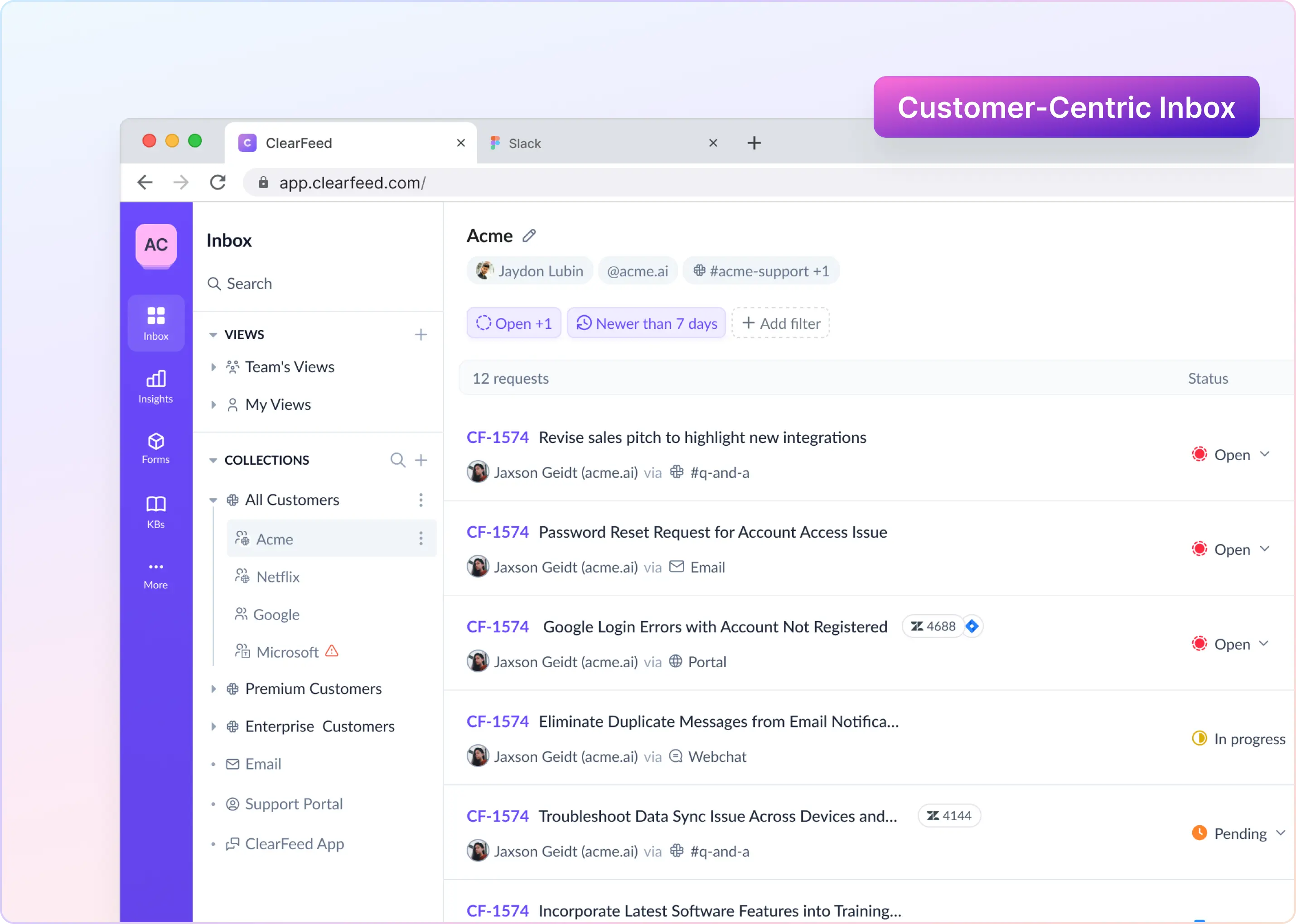Conducting online surveys may seem intimidating to businesses already stretched in time and money. You're not alone — the big problem is that people do not like filling out surveys. The more you ask them to fill out, the less they will respond. Besides, your clients and customers dread having to spend time answering something that doesn't seem important to them.
But if you can find a way for a survey to get customers' attention, they're more receptive. That is exactly what CSAT surveys do. Getting more clients and customers to do CSAT surveys on Slack has become incredibly easy. Let's break down the CSAT survey, how to build it on Slack, and how to use this tool best by implementing ClearFeed.
What Is a CSAT Survey?
CSAT survey stands for Customer Satisfaction Survey. It's a method of collecting customer feedback to determine satisfaction levels and areas that could be improved upon. This information can improve the quality and effectiveness of your offering and increase sales by improving customer loyalty and repeat business opportunities.
Customer satisfaction surveys can be conducted in various ways, but most typically consist of a few questions about a customer's experience with the product or service being offered. The responses are then scored and rated on a scale from one to five or one to seven, with five being the highest score. The scores are then divided into percentages based on the number of respondents.

How to Create a CSAT Survey?
Creating a CSAT survey can be both easy and difficult. It all depends on the type of customer satisfaction you want to measure.
The first step is to decide what your organization wants to measure. You can use this information to create your survey questions. In most cases, it's best to create several surveys depending on what you're trying to learn from your customers. For example, if you want feedback on your products or services, create a survey that asks specific questions about those products and services. If you want feedback on other aspects of your business (such as billing issues), create another survey for those topics.
Once you’ve decided what types of questions you want answered, it's time to start creating them! There are many tools available online that make creating surveys easier than ever before – we recommend using Google Forms or SurveyMonkey. Once you've created your survey, it's time to send it out into the world!
What Is the Frequency for Conducting CSAT Survey?
The frequency of conducting CSAT surveys depends on the type of industry you are in and the size of your company. For example, if your business has one location and you have a small number of customers, conducting the survey more than once every six months is unnecessary. However, if your business has multiple locations and a large customer base, it is best to survey every quarter.
The ideal frequency for conducting a CSAT survey is based on the following factors:
- The type of industry you are in
- The size of your company
- The number of products or services offered by your company
5 Things to Keep in Mind When Conducting CSAT Surveys
Surveys are a great way to get customer feedback – whether it's satisfaction scores, their perception of the company, or general comments. But surveys can be tricky to assemble, particularly if you want them to be most effective. That's why it is useful to follow a few guidelines when putting them together that will make for a better experience all around:
1. Keep it Short and Simple (KISS): Respect your customers' time by keeping the survey concise. Limit it to 5 to 10 questions so that it's easy to fill out. Ask only one question in each survey section or subsection so that respondents can focus on one issue at a time instead of trying to answer several different things simultaneously.
2. Mix Question Types: It's important to use a mix of questions when asking for feedback. Use multiple choice, Likert scale (rate from 1-5 or 1-7), Yes/No, and open-ended questions to give your customers multiple ways to express their feedback. For example,
- Rate from 1-5. Give customers a set of numbers to rate something on a scale from 1 to 5, such as “Rate this product from 1 to 5.”
- Yes/No questions. Ask customers if they agree with a statement, such as “Do you like this product?”
- Open-ended questions. Request feedback in your own words, such as “How do you feel about our service?”
3. Timely Conduct: Conducting a customer satisfaction survey shortly after the experience is important. This way, you can capture how customers feel about the service experience and what they think of your business.
Conducting a customer satisfaction survey soon after an interaction or purchase helps you gather accurate customer feedback. It also allows you to make changes before they become more entrenched in your business practices.
The longer you wait after an interaction or purchase, the less likely customers will remember their experience with your business. The longer they wait, the more likely they will have forgotten aspects of their experience.
4. Easy Access: Easing your customer's path to access and respond to CSAT surveys significantly boosts their participation. So, consider distributing your surveys through manageable channels to promote a smooth customer experience. Traditional methods include distribution through email, enhancing real-time responsiveness with live chat tools, or integrating with a ticketing system, such as Zendesk.
With the advancement in customer engagement technologies like Slack, innovative solutions like ClearFeed have emerged. ClearFeed smartly enables businesses to conduct CSAT surveys directly via Slack - a platform widely used for business collaboration. Notably, its setup process is quick and ready to roll in just a few minutes, making garnering customer feedback easier and more intuitive.
How to do CSAT survey in Slack
Slack users can now use ClearFeed's Slack-native CSAT survey tool to run CSAT Surveys within Slack. These surveys can be triggered automatically once customer requests on Slack are resolved and the results easily accessible from ClearFeed’s web console. In the following sections we dive deeper into how the CSAT Survey feature works.
- Automated CSAT Surveys in Slack
ClearFeed’s CSAT surveys are designed to be automatically triggered in Slack, either for all customer requests or specifically for tickets (only for requests which have been converted to a ticket). CSAT Surveys are part of ClearFeed’s AI-Powered Customer and Employee Support platform for Slack.
Upon resolving a request or ticket, ClearFeed prompts the requester with a CSAT survey notification in the Slack channel. The requester can quickly give feedback using an emoji scale from good to bad, correlating to a 5-point score, with the highest score represented by a smiling emoji.

- Real-time CSAT Score Tracking
The responses to the CSAT surveys are visible in the ClearFeed dashboard against each request or ticket. Additionally, these scores are accessible for download via a request CSV, offering businesses a convenient way to analyze and share customer feedback data.

- Flexibility Across Multiple Ticketing Platforms
ClearFeed's CSAT survey tool is compatible with various ticketing systems like Zendesk, Freshdesk, Jira Service Management (JSM), Salesforce, and ClearFeed's Slack-first ticketing system. This versatility ensures that businesses using different ticketing platforms can seamlessly integrate the CSAT survey into their existing workflows.
- Sample CSAT Survey on Slack
Here’s a glimpse of a sample CSAT survey in Slack powered by ClearFeed.
- Setting Up ClearFeed’s CSAT Survey in Slack
Setting up ClearFeed’s CSAT survey is a quick and straightforward process. To learn how to set this up in your Slack workspace, check out our step-by-step guide here.
Benefits of Integrating CSAT Surveys within Slack
ClearFeed's integration of CSAT surveys into Slack offers significant advantages for enhancing customer feedback processes:
- Timely Feedback Collection: Surveys within Slack enable immediate collection of feedback post-interaction, ensuring timely and relevant responses for more accurate customer insights.
- Improved Response Rates: The familiarity of Slack as a survey platform increases user participation, overcoming the usual barriers associated with external survey methods.
- Streamlined User Experience: ClearFeed's Slack integration allows users to complete surveys within their workflow, saving time and reducing workflow disruption.
- Real-Time Data for Prompt Action: Immediate feedback through Slack permits businesses to quickly analyze and respond to customer insights, crucial for timely improvements in service quality.
How to Analyze CSAT Surveys for Business Insights
Once you've gathered customer feedback through CSAT surveys, it's crucial to delve into this data for actionable business insights. ClearFeed's dashboard, with its real-time availability of CSAT scores, empowers businesses to conduct a thorough analysis of customer feedback. This process involves several key steps:
- Review Individual Responses: Start by looking at individual responses to understand specific customer experiences. Pay attention to the scores and any comments provided. This granular view can reveal immediate issues or highlights that may need addressing.
- Calculate the Overall CSAT Score: The CSAT score is typically calculated by taking the percentage of customers who gave the highest satisfaction ratings (e.g., 4 and 5 on a 5-point scale). ClearFeed automates this calculation, giving you an immediate view of the overall customer satisfaction level.
- Identify Trends and Patterns: Look for trends in the data over time. Are there specific times, events, or types of interactions that consistently result in higher or lower CSAT scores? ClearFeed’s dashboard can help visualize these trends, making it easier to spot patterns.
- Segment the Data: If possible, segment the data based on different criteria like customer demographics, types of requests, or service categories. This segmentation can provide deeper insights into how different groups or service aspects are performing.
- Compare Against Benchmarks: Compare your CSAT scores against industry benchmarks or your own historical data. This comparison can help contextualize the scores and understand how your team is performing relative to others or over time.
- Share Findings with the Team: Share the results and insights with your team. ClearFeed’s integration with Slack makes it easy to disseminate this information, ensuring everyone is aligned and aware of customer feedback trends.
The insights gained from CSAT surveys are crucial for data-driven decision-making. Businesses can use this feedback to prioritize areas for improvement, develop strategies to enhance customer experience, and track the impact of changes implemented.
Wrapping Up
Automated CSAT surveys in Slack allow for real-time feedback on support experiences. This integration fosters immediate insights, higher response rates, and cross-departmental alignment, enhancing the overall support.
The ease of use, combined with the depth of insights provided, makes Slack-native CSAT surveys an indispensable tool for any customer-centric business.
If you are interested in learning more about how to leverage ClearFeed’s CSAT Survey for your business, you can reach out to us at support@clearfeed.ai, or book a free demo with us.
















